Ultrasound robot ready for arthritis patients, thanks to Danish researchers
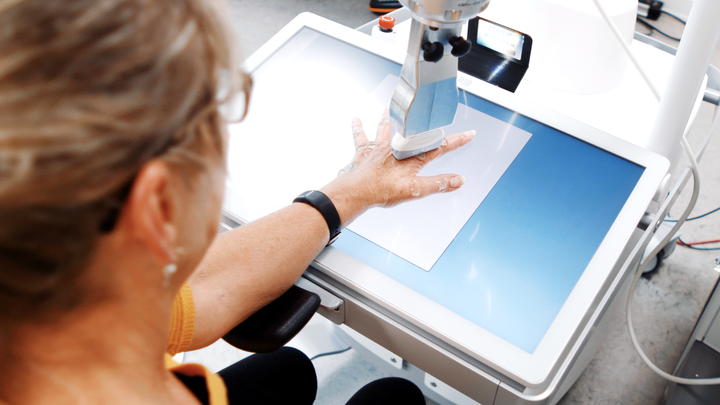
By Jane Thoning Callesen
It weighs 150 kilos, scans 11 joints per hand and handles up to four patients per hour. The name is ARTHUR – a pun on the word “arthritis” as well as “ultrasound” and “robot” – and it is a bit of a world sensation that researchers from the University of Southern Denmark (SDU) and Odense University Hospital (OUH) are now ready to bring a new robotic colleague to the health care system.
ARTHUR is the world's first fully automated clinical robot that performs ultrasound scans of patients. After three years of intensive development, the robot has just been CE-approved. Ropca Holding Aps, a research-based spin-out company that has turned the prototype into a finished product, will now market it internationally.
- We are pleased that the robot can now help patients. A fully automated and objective examination for early signs of arthritis can help many, says co-founder and consultant Søren Andreas Just from the arthritis outpatient clinic at OUH.
He got the idea for ARTHUR together with robotics professor Thiusius Rajeeth Savarimuthu from SDU, and the two of them have run a close partnership on the development of the technology and tests on patients at the hospital.
Contributes to early diagnosis
ARTHUR consists of a platform with a robotic arm, where one of the ultrasound probes already available at the hospitals is installed. Then ARTHUR'S robotic arm scans the patients' hands based on set standards. ARTHUR automatically takes pictures and analyzes them through an artificial intelligence algorithm. The robot’s report is sent directly to the doctor and the electronic health record.
- It gives the doctors a quick understanding of the level of the disease. They can use this to plan the next steps for the patient, explains Thiusius Rajeeth Savarimuthu.
The many patients who have been tested by the robot, have had only positive reviews of their experience in a recently published study. The robot can now contribute to better outcomes and quality of life for the many millions of Europeans suffering from rheumatoid arthritis.
Worldwide, rheumatoid arthritis affects about 1 percent of the population, and it is important to diagnose the disease early to avoid loss of joint function. Therefore, many patients with symptoms are referred for examination, and this puts a lot of pressure on expert Rheumatological Departments, leading to long waiting lists. There is an increasing shortage of arthritis doctors, and ARTHUR can now help solve this challenge.
Praise from a Danish university hospital
Odense University Hospital’s executive board take a positive view of the ARTHUR robot, which is a good example of how cross-disciplinary innovation between doctors and engineers can contribute to solving some of the major challenges in the healthcare system.
- It makes a big difference to the healthcare system when new, innovative solutions like ARTHUR can solve parts of our tasks. This robot solves a highly specialized job that usually requires employees with great expertise and experience. Those employees are a limited resource, so this robot opens up completely new possibilities for how we in the hospitals can give citizens the right diagnosis and treatment more quickly, says medical director at Odense University Hospital, Bjarne Dahler-Eriksen.
With the CE approval in place, ARTHUR will now start making a difference at the hospitals, and the researchers have already received inquiries from hospitals in Denmark, Germany and Canada. The price for ARTHUR is around 150000 EURO, equivalent to an advanced ultrasound scanner.
FACTS
- The CE-marked robot ARTHUR is the first fully automated clinical robot in the world to perform ultrasound scans of patients. It is a fully automatic self-service robot that examines rheumatoid arthritis through ultrasound and assesses the disease using artificial intelligence.
- The robot automatically takes high-quality standardized ultrasound images of the hands for clinical use.
- The idea for ARTHUR arose in collaboration between robotics professor Thiusius Rajeeth Savarimuthu from the Faculty of Engineering at the University of Southern Denmark (SDU) and consultant Søren Andreas Just from Odense University Hospital (OUH), who received a start-up grant from Energi Fyn. In November 2019, they founded the spin-out company Ropca Holding Aps with five private investors.
- ARTHUR passed its technical type test in November 2021, has since undergone clinical trials and has now in September 2022 been CE approved and is thus ready for sale throughout Europe.
- It weighs 150 kilos, is 138 cm tall, scans 11 joints per hand and has a capacity of four patients per hour.
- ROPCA's vision is to continue the development of robotic systems for fully automated ultrasound. ARTHUR is used for arthritis patients, but the technology behind it can also be used to study other body areas and disease groups, including heart diseases and blood clots in the legs.
- Read more at www.ropca.com.
To view this video from www.youtube.com, please give your consent at the top of this page.VIDEO: Watch the robot in action
Keywords
Contacts
Jane Thoning CallesenAfdelingschefDet Tekniske Fakultet
Tel:93 50 75 40jtca@tek.sdu.dkImages
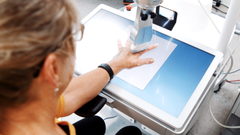
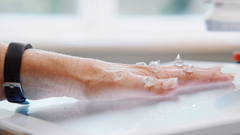
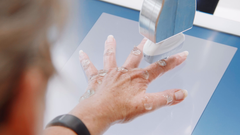
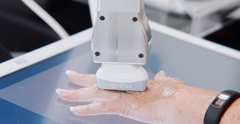

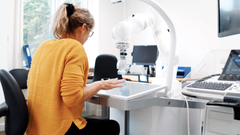
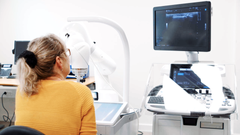
Links
About Syddansk Universitet
Subscribe to releases from Syddansk Universitet
Subscribe to all the latest releases from Syddansk Universitet by registering your e-mail address below. You can unsubscribe at any time.
Latest releases from Syddansk Universitet
Yousif Subhi udnævnt til professor i øjensygdomme ved SDU19.12.2025 11:26:25 CET | Pressemeddelelse
Professoratet skal styrke forskningen i patientnære løsninger og ny teknologi til behandling af nethindesygdomme og bidrage til udvikling, kvalitet og ny viden på området.
SDU vil styrke fremtidens sundhedsvæsen med ny kandidatuddannelse i sundhedsøkonomi19.12.2025 10:07:21 CET | Pressemeddelelse
Syddansk Universitet vil fra sommeren 2026 udbyde en ny kandidatuddannelse i sundhedsøkonomi. Uddannelsen skal imødekomme et voksende behov for specialiseret viden om økonomi i sundheds- og velfærdsområdet.
Benjamin S. B. Rasmussen udnævnt til professor i radiologi og medicinsk teknologi ved SDU15.12.2025 14:03:46 CET | Pressemeddelelse
Professoratet skal styrke forskningen i medicinsk teknologi og bidrage til udvikling, kvalitet og ny viden på området.
194.000 har fortalt om bevægelsesvaner11.12.2025 10:32:04 CET | Pressemeddelelse
Danmark i Bevægelse har nu et unikt datamateriale, som kan bruges til at skabe bedre rammer for et aktivt liv for børn og voksne.
ERC-millioner til professor Rafsanjani: Slangerobot skal lytte sig frem i ukendt terræn9.12.2025 12:10:30 CET | Pressemeddelelse
Professor Ahmad Rafsanjani har netop modtaget en prestigefuld ERC-bevilling på 15 millioner kroner. Hans projekt vil lære bløde robotter at navigere ved hjælp af lyd, friktion og origami-teknik – en evne, der kan åbne døre til både sammenstyrtede bygninger og fjerne planeter.
In our pressroom you can read all our latest releases, find our press contacts, images, documents and other relevant information about us.
Visit our pressroom
